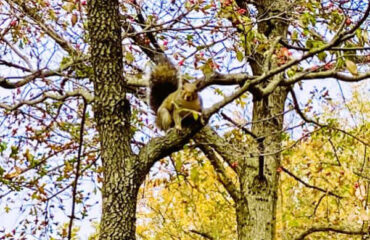Why curiosity is adult-like.
When adults see a harmless insect, they shudder. Kids get down on their knees and look at it, their eyes sparkling with curiosity. They explore it at close quarters, wondering why it looks and moves the way it does. Then they scoop it up for a closer look or allow it to go about its life. No fear. Just curiosity.
When do we lose that sense of curiosity and wonder? When do we relegate it to the back of our minds as something not worthy of nurturing? Perhaps since we first heard that adults need to get serious about life, implying that curiosity is a frivolous quality at best, a waste of our time. Curiosity is simply not ‘adult-like’.
Maybe it happens when we say to ourselves, “I’ve made it. I know enough. In fact, I know everything there is to know.” The urge to discover new information and the possibilities it might reveal are dismissed. We soothe ourselves with busyness which requires little mental effort. We surround ourselves with people who justify our biases and beliefs. We then console ourselves by rationalizing that ‘everyone else’ – by this, we mean the small circle we interact with most – isn’t curious either.
“Simply that we were lucky enough to grow up in a home environment where there was always much encouragement to children to pursue intellectual interests. We were taught to cultivate the encyclopedia habit, to look up facts about whatever aroused our curiosity. In a different kind of environment I imagine our curiosity might have been nipped long before it could have borne fruit.” – Orville Wright
When boredom and burnout hit, we are puzzled. Something is wrong but we cannot put a finger on it. After all, we have everything we are supposed to have. Or do we? We are in denial but have to listen to that little nagging voice that it ours alone. It flags us that maybe, just maybe, there are more possibilities. Those who listen hard enough know there are two choices: follow that voice or bury themselves deeper in their self-created cage, following cues from others in a similar predicament.
Following that voice kindles our curiosity. What might lie beyond that door, the one never dared approach, let alone open? What new experiences might it hold for us? What awareness might it ignite? Do we dare permit ourselves to be curious and experience wonder?
Many people fear being curious because it would upset the sameness of their lives even if it is not fulfilling. That sameness is like processed food in a supermarket with little resemblance to the real thing. Rekindled curiosity is akin to stepping out of a box into a blazing world of color, light, and possibilities. An explosion of new sensations and meaning. Most are afraid to open themselves up to new experiences. Instead, they postpone anything new for the future. That day never arrives. Isn’t it time we got more curious?
Reading up on different subjects instead of sticking to favorite authors or a single field is a good curiosity habit to nurture. Our minds are like rubber bands with a tremendous advantage – they can stretch as much as we are willing to stretch them. They contract when we restrict ourselves to sameness all our lives. Reading sows the seeds for new ideas and what might be. It makes us more curious about ourselves and the world.
“Remember to look up at the stars and not down at your feet. Try to make sense of what you see and wonder about what makes the universe exist. Be curious. And however difficult life may seem, there is always something you can do and succeed at. It matters that you don’t just give up.” ― Stephen Hawking
Curiosity makes us more open to new experiences and handle uncertainty with grace. Curious people adapt better to new environments and situations. It helps us observe our thoughts and emotions, searching for new ideas or questions that might help us. Equipped with higher awareness, curious people are able to come up with more creative solutions to problems. This in turn diminishes theirs fears and helps them think rationally.
Curiosity also helps us ask questions that benefit us rather than resigning ourselves to living a life scripted by others. We become less susceptible to misinformation and disinformation. More questions kindle a thirst for learning and push us to explore new pastures. Curiosity may be uncomfortable when you start out, but the rewards are immense. It helps you ask ‘Why is that?’ or ‘How can I…?’ instead of allowing fear to stall you by constantly asking ‘What if…?’ Mental wandering is rewarding. It helps you relax and focus more on tasks that add meaning to your life.
When you discover curiosity, you are no longer part of the crowd watching with silent envy at those who seem fulfilled and passionate about their lives. It helps you make what may have seemed an impossible leap – transcend your fears and act. When you act in sync with what you need, the task becomes the reward. Unexpected moments of joy and wonder abound.
Unadorned curiosity leads us where we most need to be and where we feel most fulfilled. It guides us with little signs placed on the meandering path to our destination rather than a single, large sign pointing in one direction. Sometimes, you need to search for a sign but you always discover it if you look hard enough. The longer you wait, the harder it becomes. The signs fade and regret sets in as life moves towards its end, as it must. Would you choose a life of curiosity or one of regret during your time on this planet? The choice is yours.
“The mind is not a vessel to be filled, but a fire to be kindled.” ― Plutarch





Comments (1)
If there were a course in curiosity, this would be a good introductory reading!